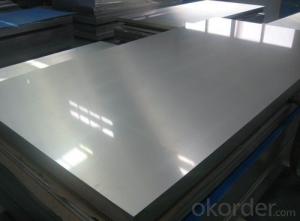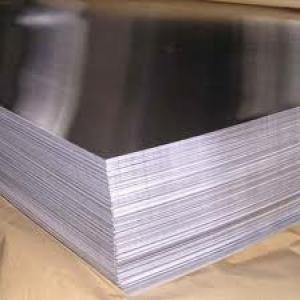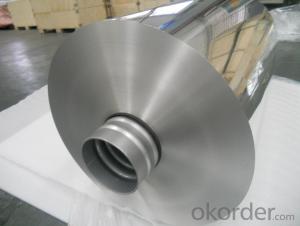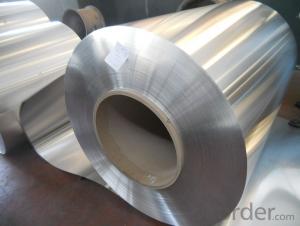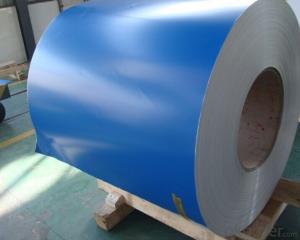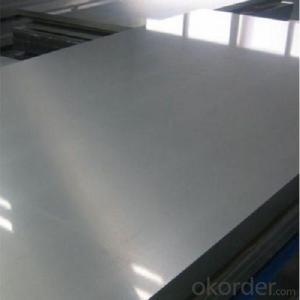7000 Series Alloy Mill Finished Aluminum Sheets
- Loading Port:
- China main port
- Payment Terms:
- TT OR LC
- Min Order Qty:
- 5 m.t.
- Supply Capability:
- 5000 m.t./month
OKorder Service Pledge
OKorder Financial Service
You Might Also Like
Item specifice
1.Description of 7000 Series Alloy Mill Finished Aluminum Sheets
| Product | Aluminum sheet |
| Country of Origin | China mainland |
| Alloy | 7075 |
| Temper | T6 |
| Width | 200-1500mm |
| Thinkness | 6-100mm |
| Length | less than 8000mm |
| MOQ | according to different size,normal 5 tons |
| Payment Terms | T/T;L/C |
| Loading Port | DaLian,Tianjing,Shanghai |
| Delivery Time | Within 30 days after receiving the prepayment or original L/C |
2. Technical Parameters of 7000 Series Alloy Mill Finished Aluminum Sheets
alloy | temper | thinkness mm | Tensile strength Rm MPa | The strength of extension Rp0.2 MPa | elongation % |
7075 | 0 | >0.50~1.50 | ≤250 | ≤140 | 10 |
>1.50~4.00 | ≤260 | ≤140 | 10 | ||
>4.00~12.50 | ≤270 | ≤145 | 10 | ||
>12.50~25.00 | ≤275 | — | — | ||
T625 | >0.50~1.00 | 485 | 415 | 7 | |
>1.00~1.50 | 495 | 425 | 8 | ||
>1.50~4.00 | 505 | 435 | 8 | ||
>4.00~6.00 | 515 | 440 | 8 | ||
>6.00~12.50 | 515 | 445 | 9 | ||
>12.50~25.00 | 540 | 470 | — | ||
T6 | >0.50~1.00 | 485 | 415 | 7 | |
>1.00~1.50 | 495 | 425 | 8 | ||
>1.50~4.00 | 505 | 435 | 8 | ||
>4.00~6.00 | 515 | 440 | 8 | ||
>6.00~100.00 | — | — | — |
3. Feature of 7000 Series Alloy Mill Finished Aluminum Sheets
*Such coil is specially designed to replace aluminum ingot, due to the high export tax of aluminum ingot, the coil has better price than ingot.
*This type of coil can fit customer's remelting furnace just like ingot, no need to make any change to the production line that was previously used for ingot. The standard coil size and weight is very suitable for the feed gate of furnace.
*This type of coil causes less material wastage than ingot when remelted.
*Our coil is made directly from ore, no need to go though the ingot making process, quality is much better than other suppliers who use ingot scrap to make coil.
Be free from Oil Stain, Dent, Inclusion, Scratches, Stain, Oxide Dicoloration, Breaks, Corrosion, Roll Marks, Dirt Streaks and other defect which will interfere with use
4. Certificate:
SGS and ROHS(if client request, paid by client), MTC(plant provided), Certificate of Origin(FORM A, FORM E, CO), Bureau Veritas and SGS (if client request, paid by client), CIQS certificate
5. Image of 7000 Series Alloy Mill Finished Aluminum Sheets
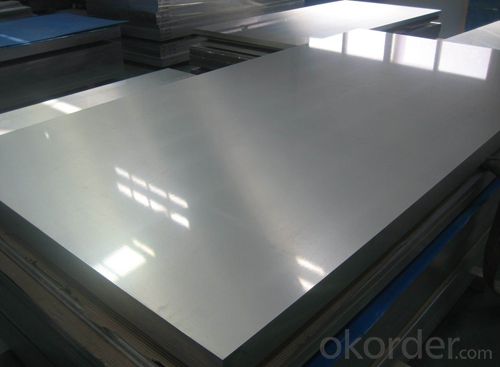
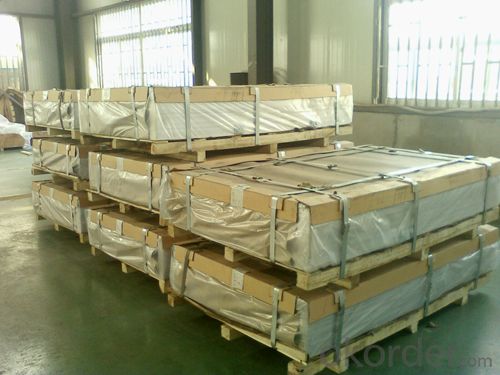
6. FAQ
1) What is your delivery time?
Our regular production time is over 30 days, It depends on the order quantity also.
2) What is your payment term?
We accept T/T, LC at sight, Usance LC 30, 60, 90, 120, 180 DAYS.
3) What is your price structure?
Our foil price is based on Shanghai Metal Price(SMM), not LME, but we could offer LME+ Conversion for your reference.
4) What is your Delivery term?
We do FOB, CFR, CIF, we don't do DDP.
5) Could you offer sample?
We could offer sample as your requirement. A4 Size sample is free for you, for bigger roll sample, it depends on the coil weight.
- Q:Are aluminum sheets resistant to UV radiation?
- Generally, aluminum sheets are resistant to UV radiation. Aluminum is well-known for its exceptional resistance to corrosion, which also applies to its resistance to UV radiation. The naturally formed oxide layer on the surface of aluminum acts as a shield, safeguarding it against the harmful effects of UV rays. This protective layer ensures that the aluminum does not deteriorate or fade when exposed to sunlight or other UV radiation sources. Nevertheless, it is worth noting that prolonged exposure to intense UV radiation may eventually cause some degradation or discoloration of the aluminum surface. Hence, while aluminum sheets are highly resistant to UV radiation, it is advisable to provide additional protection, such as coatings or paint, for applications that involve extended exposure to harsh UV environments.
- Q:What are the typical thickness options for aluminum sheets?
- The typical thickness options for aluminum sheets range from 0.006 inches to 0.25 inches, depending on the specific application and requirements.
- Q:I need help with this question for a report i'm doing, it's about recycling aluminium, please could you give me some reasons why to recycle aluminium and eg.saves energy, and how it does eg. saves energy by...Thanks a lot this will help me loads.P.S this is just a report for my science project.
- This Site Might Help You. RE: Why should we recycle aluminium? I need help with this question for a report i'm doing, it's about recycling aluminium, please could you give me some reasons why to recycle aluminium and eg.saves energy, and how it does eg. saves energy by... Thanks a lot this will help me loads. P.S this is just a report for my science project.
- Q:Can aluminum sheets be used for protective enclosures?
- Aluminum sheets have the ability to be utilized for protective enclosures. This material, known for its versatility and lightweight nature, offers exceptional durability and resistance to corrosion. It can easily be transformed into various shapes and sizes, making it suitable for constructing protective enclosures across a wide range of applications. Industries such as electronics, telecommunications, aerospace, and automotive commonly employ aluminum enclosures, which safeguard against environmental factors like moisture, dust, and electromagnetic interference. Moreover, these enclosures can be further improved with the addition of coatings or insulation materials to meet specific requirements for thermal insulation, fire resistance, or electrical conductivity. All in all, aluminum sheets are a dependable option for protective enclosures due to their strength, adaptability, and capacity to endure challenging conditions.
- Q:We just bought a house with aluminum wiring and we knew about it in the inspection report, but everyone kept telling us it's no big deal. There was so much going on and I didn't look into it myself and now I just surfed the web on it and I am filled with anxiety! Please help! Did we make a huge mistake? How common are the dangers? Also, my insurance company didn't ask me about wiring, but some sites said that they don't cover aluminum wiring. Should I ask them? I am so overwhelmed and scared. I do not want a fire for my family!
- All of these answers are good. There is a concern. I would suggest that if there is a question of security -- that you slip ( or get an electrician) to slip each switch and outlet out of the wiring box and tighten the connections. As for the racoons, there are simple and pretty much low cost (under 30 bucks, voltage sensors at your local electrical supply, and maybe at Home-Depot. These really nice devices sense the presence of AC electricity in the wall, even locating the actual point where the electricity stops at a break! This is a do-it=yourself project.
- Q:Can the aluminum sheets be used for manufacturing architectural sunshades?
- Aluminum sheets are indeed suitable for the production of architectural sunshades. This material is commonly chosen for sunshades because of its lightweight quality, durability, and resistance to corrosion. It can be effortlessly shaped and sized, providing versatility in design. Moreover, aluminum possesses exceptional heat reflectivity attributes, effectively minimizing solar heat absorption and offering shade to buildings. In conclusion, aluminum sheets serve as an excellent choice for the manufacturing of architectural sunshades.
- Q:Can aluminum sheet be used for electrical bus bars?
- Yes, aluminum sheet can be used for electrical bus bars. Aluminum is a commonly used material for bus bars due to its high electrical conductivity, lightweight nature, and cost-effectiveness.
- Q:How do aluminum sheets perform in terms of heat reflectivity?
- Aluminum sheets exhibit remarkable heat reflectivity, making them exceedingly efficient. Their ability to effectively deflect heat and light away from surfaces minimizes heat absorption, thus rendering them perfect for scenarios where heat control is paramount, like roofing, insulation, and solar panels. The reflective quality of aluminum sheets aids in curbing energy consumption by preventing excessive heat accumulation, leading to a cooler atmosphere. Moreover, the reflectivity of aluminum also lends itself to a multitude of industrial and scientific applications, including the production of reflectors, heat sinks, and optical mirrors.
- Q:What are the weight considerations when using aluminum sheets?
- Weight considerations play a significant role in various applications and industries when utilizing aluminum sheets. Aluminum's lightweight nature makes it a preferred choice in scenarios where weight reduction is essential. Here are some key factors to consider regarding weight when using aluminum sheets: 1. Structural Weight Reduction: Industries such as aerospace, automotive, and construction commonly use aluminum sheets to reduce the overall weight of structures. Aluminum's lightweight nature allows for improved fuel efficiency in vehicles, increased payload capacity, and lower transportation costs for construction materials. 2. Design Flexibility: Aluminum sheets offer greater design flexibility compared to heavier materials due to their low density. This weight advantage enables engineers and designers to create intricate shapes and structures without compromising on strength and durability. 3. Handling and Installation: The lightweight nature of aluminum sheets simplifies handling and installation processes. It requires fewer manpower and equipment, reducing labor costs and increasing productivity. Additionally, aluminum's low weight makes it easier to transport and maneuver during assembly or installation. 4. Corrosion Resistance: Aluminum naturally forms a protective oxide layer, making it highly resistant to corrosion. This eliminates the need for additional coatings or treatments, reducing weight and maintenance requirements. 5. Energy Efficiency: Using aluminum sheets can help reduce energy consumption in various applications. For instance, lightweight aluminum roofing in the construction industry can improve the energy efficiency of buildings by reducing the load on heating and cooling systems. 6. Transport and Shipping: Aluminum's lightweight property significantly impacts transportation and shipping costs. The reduced weight of aluminum sheets allows for larger quantities to be transported in a single shipment, thereby reducing fuel consumption and emissions. 7. Electrical Applications: Aluminum is an excellent conductor of electricity. Its lightweight nature makes it an ideal choice for electrical wiring, conductors, and other electrical components, reducing the overall weight of electrical systems. It is important to note that while weight reduction is advantageous in many applications, the specific requirements and constraints of each project should be considered. Proper engineering analysis and consultation are crucial to ensure that the selected aluminum sheet meets the desired weight considerations while maintaining structural integrity and performance.
- Q:What is the bending radius of aluminum sheets?
- The bending radius of aluminum sheets depends on various factors such as the thickness of the sheet, the alloy of aluminum being used, and the type of bending process. Generally, aluminum sheets with a thickness of 1mm or less can be bent to a radius equal to the sheet thickness without cracking. For thicker aluminum sheets, the bending radius should be larger than the sheet thickness to avoid cracking or fracturing. As a general rule, the bending radius for aluminum sheets with a thickness between 1mm and 6mm should be at least 1.5 times the sheet thickness. For example, a 3mm thick aluminum sheet should have a minimum bending radius of 4.5mm. It is important to note that these guidelines are approximate and may vary depending on the specific alloy and temper of aluminum being used. Furthermore, different bending processes such as air bending, bottoming, or coining may require different bending radii. It is recommended to consult the manufacturer's specifications or seek professional advice for precise bending radius requirements for specific aluminum sheet applications.
1. Manufacturer Overview |
|
|---|---|
| Location | |
| Year Established | |
| Annual Output Value | |
| Main Markets | |
| Company Certifications | |
2. Manufacturer Certificates |
|
|---|---|
| a) Certification Name | |
| Range | |
| Reference | |
| Validity Period | |
3. Manufacturer Capability |
|
|---|---|
| a)Trade Capacity | |
| Nearest Port | |
| Export Percentage | |
| No.of Employees in Trade Department | |
| Language Spoken: | |
| b)Factory Information | |
| Factory Size: | |
| No. of Production Lines | |
| Contract Manufacturing | |
| Product Price Range | |
Send your message to us
7000 Series Alloy Mill Finished Aluminum Sheets
- Loading Port:
- China main port
- Payment Terms:
- TT OR LC
- Min Order Qty:
- 5 m.t.
- Supply Capability:
- 5000 m.t./month
OKorder Service Pledge
OKorder Financial Service
Similar products
New products
Hot products
Related keywords
